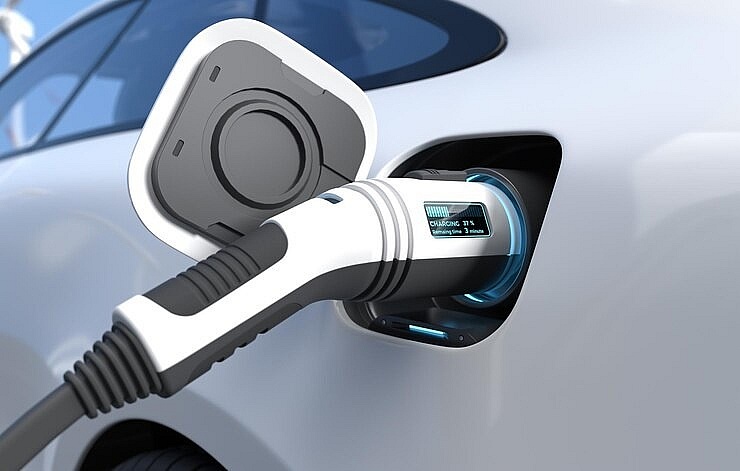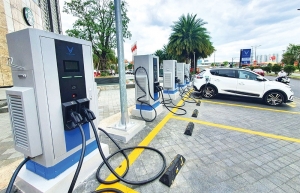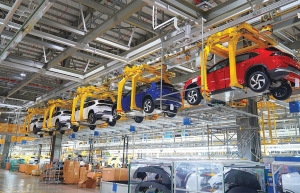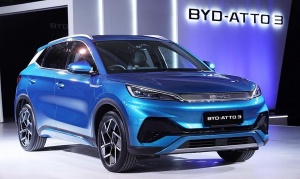Need is urgent for e-vehicle charging infrastructure
Transport experts participated in a workshop on charging station standards for electric vehicles (EVs) last week in Ho Chi Minh City, covering development of layout plans, unifying technical standards, power source capacity, and charging station management issues for EVs.
 |
| Need is urgent for e-vehicle charging infrastructure, illustration photo/ Source: freepik.com |
Patrick Haverman, deputy resident representative of the United Nations in Vietnam, commented that Ho Chi Minh City plays an important role in Vietnam and Southeast Asia in terms of transport.
“The number of personal vehicles in Ho Chi Minh City accounts for 90 per cent of travel needs. This contributes significantly to the city’s high emissions of greenhouse gases and air pollutants. Meanwhile, the market share of public transportation such as buses is low,” Haverman said.
According to Dr. Tran Trong Dat, head of the research team from Hanoi University of Science and Technology, one of the first things to consider when planning EV charging stations is location.
“Charging stations are often planned and located at key locations such as gas stations, rest stops, apartment and office buildings, parking lots, shopping malls, universities, and resorts. Charging stations need to share information with each other and connect to operate the same system,” Dat stated.
Dat said that it is possible to pull in many investors in building charging stations with financial incentives and legal support for infrastructure development. There can also be energy price discounts or subsidies during the first few years of operation and simplified construction permits, particularly in busy urban areas.
“In addition, collaboration agreements, from charging station leasing and co-ownership to subscription-based charging as a service package for electric public transport fleets, are also elements to pull in investors,” Dat said.
According to Nguyen Van Khoi, head of the Directorate for Standards, Metrology, and Quality under the Ministry of Science and Technology (MoST), connecting a common EV charging station system to the national electricity system will require a lot of power consumption.
“Besides the safety issue, it needs to help vehicles of different brands share the same charging station,” Khoi said.
To date, the MoST has developed 11 Vietnamese standards on EV charging stations, based on equivalent global standards.
In mid-2022, an action programme was approved for green energy conversion and reducing carbon dioxide and methane emissions in the transportation sector. Accordingly, all buses will be replaced with vehicles using electricity and green energy between 2025 and 2030. It also included plans to transfer all taxi cabs to electric and green energy before 2050.
According to BMI Research, passenger EV sales in Vietnam will grow an average annual rate of 25.8 per cent between 2023 and 2032, to reach annual sales of about 65,000 units, up from 8,400 units in 2022.
Vietnam’s passenger EV market is currently dominated by VinFast, holding more than half of the market share in 2022. The rest of the market is held by Chinese brands.
The Vietnam Automobile Manufacturers’ Association predicts that EV ownership will reach one million by 2028 and 3.5 million by 2040. According to the Ministry of Transport, from 2018 to the end of 2022, Vietnam had more than 7,800 electric cars operated in the market.
A series of domestic automobile manufacturers and assemblers such as TMT Motors, THACO, TC Motors, and a range of foreign groups are planning to launch their first EV products in Vietnam.
In contrast, the development of charging infrastructure in Vietnam is not positive, with VinFast holding the lion’s share of ownership across all cities and provinces throughout the country.
In the last two years, the company has focused more on new product types, developing battery technology, transportation services, exporting cars, and building factories in other countries.
 | VinFast makes its move to disrupt e-vehicle industry With VinFast’s debut on the Nasdaq catapulting the Vietnamese e-vehicle company onto the global stage, experts noted that a well-defined strategic approach ahead could help it maintain some momentum. |
 | Added spark wanted for EV charge stations With the increasing demand for e-vehicles, Vietnam is going to have to think outside the box in terms of charging station infrastructure, to ensure a safe system capable of handling the greater interest. |
 | A pivotal phase for e-car market growth Though seeing positive signals in the Vietnamese market over the past year, e-car manufacturers are moving with new plans in 2024 with some hesitation. |
 | China's BYD sets eyes on Vietnam Chinese electric-vehicle (EV) manufacturer BYD plans to set up an assembly plant in Vietnam, following those in Thailand and Indonesia, to meet the growing demand for affordable EVs in Southeast Asia. |
What the stars mean:
★ Poor ★ ★ Promising ★★★ Good ★★★★ Very good ★★★★★ Exceptional
Related Contents
Latest News
More News
- Kurz Vietnam expands Gia Lai factory (February 27, 2026 | 16:37)
- SK Innovation-led consortium wins $2.3 billion LNG project in Nghe An (February 25, 2026 | 07:56)
- THACO opens $70 million manufacturing complex in Danang (February 25, 2026 | 07:54)
- Phu Quoc International Airport expansion approved to meet rising demand (February 24, 2026 | 10:00)
- Bac Giang International Logistics Centre faces land clearance barrier (February 24, 2026 | 08:00)
- Bright prospects abound in European investment (February 19, 2026 | 20:27)
- Internal strengths attest to commitment to progress (February 19, 2026 | 20:13)
- Vietnam, New Zealand seek level-up in ties (February 19, 2026 | 18:06)
- Untapped potential in relations with Indonesia (February 19, 2026 | 17:56)
- German strengths match Vietnamese aspirations (February 19, 2026 | 17:40)

 Tag:
Tag:




















 Mobile Version
Mobile Version